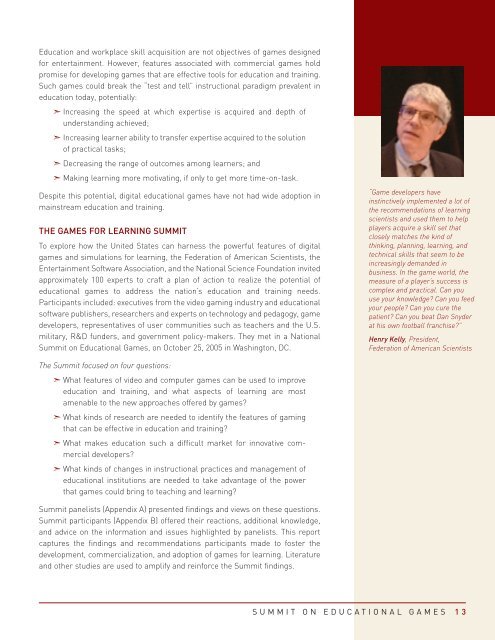Summit on Educational Games - Federation of American Scientists
Summit on Educational Games - Federation of American Scientists
Summit on Educational Games - Federation of American Scientists
Create successful ePaper yourself
Turn your PDF publications into a flip-book with our unique Google optimized e-Paper software.
Educati<strong>on</strong> and workplace skill acquisiti<strong>on</strong> are not objectives <strong>of</strong> games designed<br />
for entertainment. However, features associated with commercial games hold<br />
promise for developing games that are effective tools for educati<strong>on</strong> and training.<br />
Such games could break the “test and tell” instructi<strong>on</strong>al paradigm prevalent in<br />
educati<strong>on</strong> today, potentially:<br />
➣ Increasing the speed at which expertise is acquired and depth <strong>of</strong><br />
understanding achieved;<br />
➣ Increasing learner ability to transfer expertise acquired to the soluti<strong>on</strong><br />
<strong>of</strong> practical tasks;<br />
➣ Decreasing the range <strong>of</strong> outcomes am<strong>on</strong>g learners; and<br />
➣ Making learning more motivating, if <strong>on</strong>ly to get more time-<strong>on</strong>-task.<br />
Despite this potential, digital educati<strong>on</strong>al games have not had wide adopti<strong>on</strong> in<br />
mainstream educati<strong>on</strong> and training.<br />
THE GAMES FOR LEARNING SUMMIT<br />
To explore how the United States can harness the powerful features <strong>of</strong> digital<br />
games and simulati<strong>on</strong>s for learning, the Federati<strong>on</strong> <strong>of</strong> <strong>American</strong> <strong>Scientists</strong>, the<br />
Entertainment S<strong>of</strong>tware Associati<strong>on</strong>, and the Nati<strong>on</strong>al Science Foundati<strong>on</strong> invited<br />
approximately 100 experts to craft a plan <strong>of</strong> acti<strong>on</strong> to realize the potential <strong>of</strong><br />
educati<strong>on</strong>al games to address the nati<strong>on</strong>’s educati<strong>on</strong> and training needs.<br />
Participants included: executives from the video gaming industry and educati<strong>on</strong>al<br />
s<strong>of</strong>tware publishers, researchers and experts <strong>on</strong> technology and pedagogy, game<br />
developers, representatives <strong>of</strong> user communities such as teachers and the U.S.<br />
military, R&D funders, and government policy-makers. They met in a Nati<strong>on</strong>al<br />
<str<strong>on</strong>g>Summit</str<strong>on</strong>g> <strong>on</strong> Educati<strong>on</strong>al <strong>Games</strong>, <strong>on</strong> October 25, 2005 in Washingt<strong>on</strong>, DC.<br />
The <str<strong>on</strong>g>Summit</str<strong>on</strong>g> focused <strong>on</strong> four questi<strong>on</strong>s:<br />
➣ What features <strong>of</strong> video and computer games can be used to improve<br />
educati<strong>on</strong> and training, and what aspects <strong>of</strong> learning are most<br />
amenable to the new approaches <strong>of</strong>fered by games?<br />
➣ What kinds <strong>of</strong> research are needed to identify the features <strong>of</strong> gaming<br />
that can be effective in educati<strong>on</strong> and training?<br />
➣ What makes educati<strong>on</strong> such a difficult market for innovative commercial<br />
developers?<br />
➣ What kinds <strong>of</strong> changes in instructi<strong>on</strong>al practices and management <strong>of</strong><br />
educati<strong>on</strong>al instituti<strong>on</strong>s are needed to take advantage <strong>of</strong> the power<br />
that games could bring to teaching and learning?<br />
<str<strong>on</strong>g>Summit</str<strong>on</strong>g> panelists (Appendix A) presented findings and views <strong>on</strong> these questi<strong>on</strong>s.<br />
<str<strong>on</strong>g>Summit</str<strong>on</strong>g> participants (Appendix B) <strong>of</strong>fered their reacti<strong>on</strong>s, additi<strong>on</strong>al knowledge,<br />
and advice <strong>on</strong> the informati<strong>on</strong> and issues highlighted by panelists. This report<br />
captures the findings and recommendati<strong>on</strong>s participants made to foster the<br />
development, commercializati<strong>on</strong>, and adopti<strong>on</strong> <strong>of</strong> games for learning. Literature<br />
and other studies are used to amplify and reinforce the <str<strong>on</strong>g>Summit</str<strong>on</strong>g> findings.<br />
“Game developers have<br />
instinctively implemented a lot <strong>of</strong><br />
the recommendati<strong>on</strong>s <strong>of</strong> learning<br />
scientists and used them to help<br />
players acquire a skill set that<br />
closely matches the kind <strong>of</strong><br />
thinking, planning, learning, and<br />
technical skills that seem to be<br />
increasingly demanded in<br />
business. In the game world, the<br />
measure <strong>of</strong> a player’s success is<br />
complex and practical. Can you<br />
use your knowledge? Can you feed<br />
your people? Can you cure the<br />
patient? Can you beat Dan Snyder<br />
at his own football franchise?”<br />
Henry Kelly, President,<br />
Federati<strong>on</strong> <strong>of</strong> <strong>American</strong> <strong>Scientists</strong><br />
SUMMIT ON EDUCATIONAL GAMES 13
















